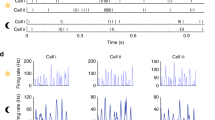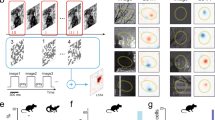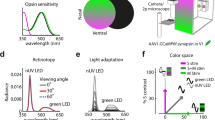Abstract
WE recently presented evidence that rods encoded ϕ, the quantum catch from a flash, into a nerve signal of magnitude N, where N=ϕ/(ϕ+σ), and σ, the semi-saturation constant, is about 800 quanta absorbed per rod per flash. The electroretinogram (ERG) was also recorded for various intensities of ϕ, and it was found that N coincided with the a wave amplitude when both were plotted against log ϕ and scaled to the same maximum1. Thus it seemed possible that a was the electric sign of N. Here we consider adaptation by steady backgrounds for the light this throws on N and also the a and b waves of the ERG.
This is a preview of subscription content, access via your institution
Access options
Subscribe to this journal
Receive 51 print issues and online access
$199.00 per year
only $3.90 per issue
Buy this article
- Purchase on Springer Link
- Instant access to full article PDF
Prices may be subject to local taxes which are calculated during checkout
Similar content being viewed by others
References
Alpern, M., Rushton, W. A. H., and Torii, S., Nature, 223, 1171 (1969).
Aguilar, M., and Stiles, W. S., Optica Acta, 1, 59 (1954).
Rushton, W. A. H., J. Physiol., 168, 345 (1963).
Author information
Authors and Affiliations
Rights and permissions
About this article
Cite this article
ALPERN, M., FULTON, A., RUSHTON, W. et al. Effect of Adaptation on the Retinal Nerve Code. Nature 224, 712–713 (1969). https://doi.org/10.1038/224712a0
Received:
Issue Date:
DOI: https://doi.org/10.1038/224712a0
Comments
By submitting a comment you agree to abide by our Terms and Community Guidelines. If you find something abusive or that does not comply with our terms or guidelines please flag it as inappropriate.



